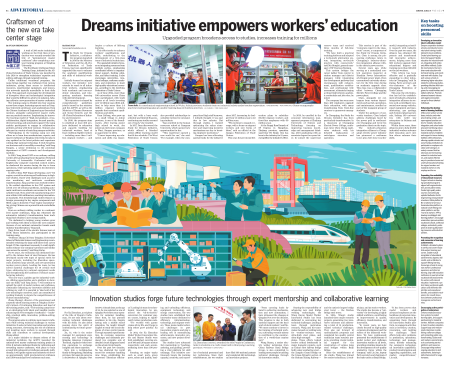
A total of 200 senior technicians working on the front lines of production were recently awarded the title of "national-level master craftsmen" after completing a one-year training program at Tsinghua University.
The first Master Craftsman Talent Training Camp, initiated by the All-China Federation of Trade Unions, was launched in July 2024 to strengthen technicians' expertise and address skill gaps through targeted training.
Unlike traditional vocational programs, the camp brings together top craftsmen from various industries, giving them access to intellectual resources, experimental equipment, and innovation networks typically unavailable in their daily work. This approach encourages the development of disruptive ideas and technological integration that would be difficult to achieve in isolation, helping cultivate a new generation of master craftsmen.
The training camp is divided into four sessions across three stages, featuring experts such as Tsinghua University professors and academicians from the Chinese Academy of Engineering as theoretical mentors, alongside national-level master craftsmen as practical mentors. Emphasizing its innovative learning model of "high-end guidance, cross-collaboration, digital integration, focused practice, diverse learning, and systematic support", the camp enables participants to engage in collaborative problem-solving with their mentors. Trainees also take part in a variety of enriching campus activities.
"Participating in the training camp not only allows us to learn from academicians, experts, and master craftsmen at Tsinghua University, but also to stay updated on the latest policies and experience cutting-edge national technology. It truly broadens our horizons and is incredibly rewarding," said Yang Yongxiu, a senior technician in the prototype department at FAW's research and development institute.
In 2010, Yang joined FAW as an ordinary milling worker after graduating from Changchun Technical University of Automobile. Confronted with an English-only computer numerical control system, he shadowed his mentor during the day to learn operations, while spending nights in his dormitory copying codes.
In 2018, China FAW began developing a new V12 engine, crucial for achieving self-sufficiency in high-end vehicles. Faced with challenges such as precision machining and multi-axis coordinate transformation, Yang and his team worked tirelessly. He verified algorithms in the CNC system and solved over 20 technical problems, including automatic multi-axis coordinate conversion for the V12 cylinder head. They achieved manufacturing precision within 0.015 millimeters, reaching international standards. This breakthrough ended reliance on foreign processing for key engine components and filled a gap in domestic V-type engine manufacturing, giving Chinese cars a powerful and controllable "heart".
From an ordinary milling worker to a national-level master craftsman, Yang has witnessed the automotive industry's transformation from traditional fuel vehicles to new energy models.
"I'm dedicated to helping young workers grow and working with them to boost the core competitiveness of our national automotive brands amid industry transformation," Yang said.
Yang Jin'an, head of the electric furnace team at CITIC Heavy Industries, also participated in the training camp.
"Professor Zhang Chi from Tsinghua University's School of Materials Science and Engineering recommended switching the large mill liners from cast to forged. If this experiment succeeds, it could significantly enhance our company's products and similar ones across the country," said Yang Jin'an.
For 41 years, the technician has dedicated himself to the intense heat of steel furnaces. He has developed nearly 100 types of special steels for major projects, including the Shenzhou spacecraft, domestic large aircraft, and new-generation nuclear power plants. Leading his team, he has solved material challenges for 18 critical steel types, addressing key national equipment needs and strengthening the backbone of China's manufacturing industry.
"The new era is a golden age for industrial workers, offering opportunities and a platform to showcase our skills," said Yang Jin'an. "I will continue to uphold the spirit of model workers and craftsmen, continually enhancing my innovation abilities and refining my craft. It is essential to 'take hold of key core technologies ourselves', and I am committed to working tirelessly to elevate the competitiveness of Chinese manufacturing."
Zhang Zhongyi, director of the government and corporate talent learning center at Tsinghua University's School of Continuing Education and head of the training project, said: "This training camp focuses on developing both talent and tangible results, enhancing the 'five strengths of craftsmen' — leadership, practical skills, innovation, problem-solving, and heritage."
The program aims to cultivate more master craftsmen while solving technical challenges in various industries. It seeks to foster innovation and produce strong outcomes, showcasing the role of craftsmen and inspiring more workers to succeed through skills and contribute to national development, Zhang added.
As a major initiative to deepen reform of the industrial workforce, the ACFTU launched the national-level master craftsman training project in 2024. It includes dedicated funds for cultivating and rewarding master craftsmen, with plans to train around 200 national-level craftsmen annually. Additionally, it will guide regions and industries to develop approximately 1,000 provincial-level craftsmen and 5,000 municipal-level craftsmen each year.

